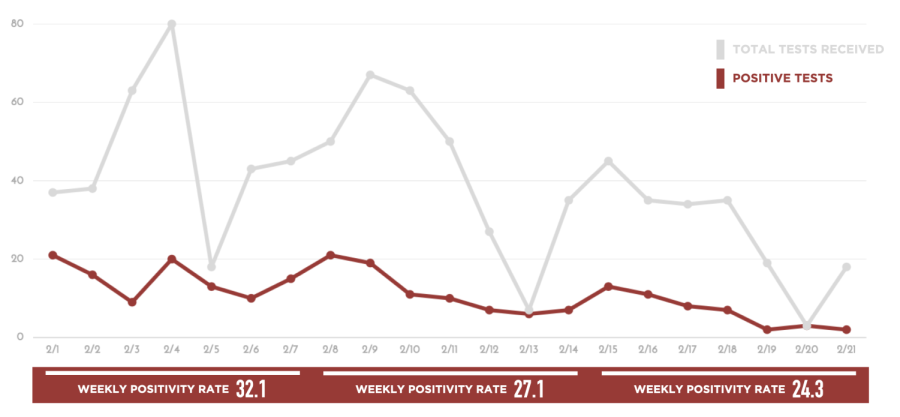Wendt Scheduled to Close as Colgate Adjusts Response Strategy
The former Wendt University Inn, which has been a primary isolation space for COVID-19 positive student cases this semester after serving as student housing in the fall, is scheduled to close on March 4 for renovations to convert the space back into a hotel. This move was scheduled in preparation for upcoming commencement and alumni events, and aligns with the university’s ongoing discussions regarding a shift in pandemic response.
“It is our very specific plan and desire to move away from the Wendt being an isolation space, and [we are planning] the conversion of the Wendt back into an inn this semester,” said President Brian Casey. “We have two commencements and two alumni weekends. [The Wendt] must be a hotel for those four weekends to possibly happen.”
According to Casey, the Wendt was originally scheduled to close for renovations on Feb. 7, but this date was pushed back, first to the end of February, and now to early March. Currently, approximately 55% of students who test positive for COVID-19 are placed in on-campus isolation, according to Dr. Ellen Larson, a physician at Student Health Services. Since the fall of 2020, the former Wendt University Inn, located at 175 Utica St., has been one of the primary isolation spaces for students who isolate on-campus. As a result, the university has designated alternative isolation options to replace it when it closes.
According to Brittany Fuller, Campus Safety compliance manager, students who test positive starting Tuesday, Feb. 22 are no longer being placed for isolation at 175 Utica Street to ensure that the space is empty so renovations can begin. At this time, alternative isolation locations and their capacities have not been publicly disclosed. In a Colgate Digest email sent to the campus community on Feb. 14, Vice President for Communications Laura Jack assured the community that they would be notified of any changes to isolation spaces or practices, but no official announcements have been made as of Tuesday, Feb. 22.
As of Monday, Feb. 21, positive student case numbers are trending down according to Colgate’s Health Analytics Dashboard, which reports a 1.3% student infection rate, a stark drop from 3.5% at the start of last week. While these statistics seem to point toward a strong downward trend of positive cases, the percentages are based on the total student population. According to the dashboard, the total number of tests administered has trended down this week as well, matching patterns of new positive cases.
Following the lifting of the masking requirement for indoor spaces by New York Governor Kathy Hochul, Colgate’s Task Force on Reopening and the Executive Group moved to remove the on-campus mask mandate — with some exceptions — beginning Feb. 16, according to Jack’s Feb. 14 email.
“The Task Force acknowledges that such a shift should not be taken as an indication that ‘the pandemic is over,’ but that our campus community’s very high vaccination and booster rate allows us to operate in a space where infections pose low levels of risk to the health of the community,” Jack wrote.
The move also brings forth some concerns from community members, as voiced by junior Maira Suleman.
“I think [the mask-optional policy] is problematic because it doesn’t really pay mind to people who are immunocompromised on campus. A friend of mine has diabetes and, despite her voicing concern about it, one of her professors made masks optional in class,” Suleman said. “I think that this no-mask policy might not even last, just because COVID-19 cases will probably go back up, and we’re going to have to go back to masks after having developed a lot of cases.”
Senior Becca Overton, an emergency medical technician (EMT) involved with COVID-19 testing and vaccine booster clinics, doesn’t take issue with the new policy.
“I feel it’s a step forward to normalcy and to herd immunity so I don’t see a huge issue with it. I feel that if the majority of students are vaccinated and boosted then it shouldn’t be a huge problem,” she said.
Colgate University officials are confident the community’s high vaccination status will keep cases from becoming unmanageable.
“New cases on campus continue to trend downward, and we are thankful that a large swath of our student, faculty and staff populations are vaccinated and boosted. As a result, we do not anticipate a significant increase in cases as a result of the mask-optional policy,” Brittany Fuller said. “We will continue to keep an eye on the data and we are ready to make adjustments in our policies as needed based on day-to-day circumstances.”
New COVID-19 cases and other statistics will continue to be updated regularly on the Health Analytics Dashboard on the Colgate website.
Ani Arzoumanian is a senior from Ridgewood, NJ concentrating in neuroscience with minors in creative writing and anthropology. She volunteers as a firefighter/EMT...

Kirby Goodman is a senior from Minneapolis, Minnesota concentrating in peace and conflict studies with a minor in political science. She's previously served as...







